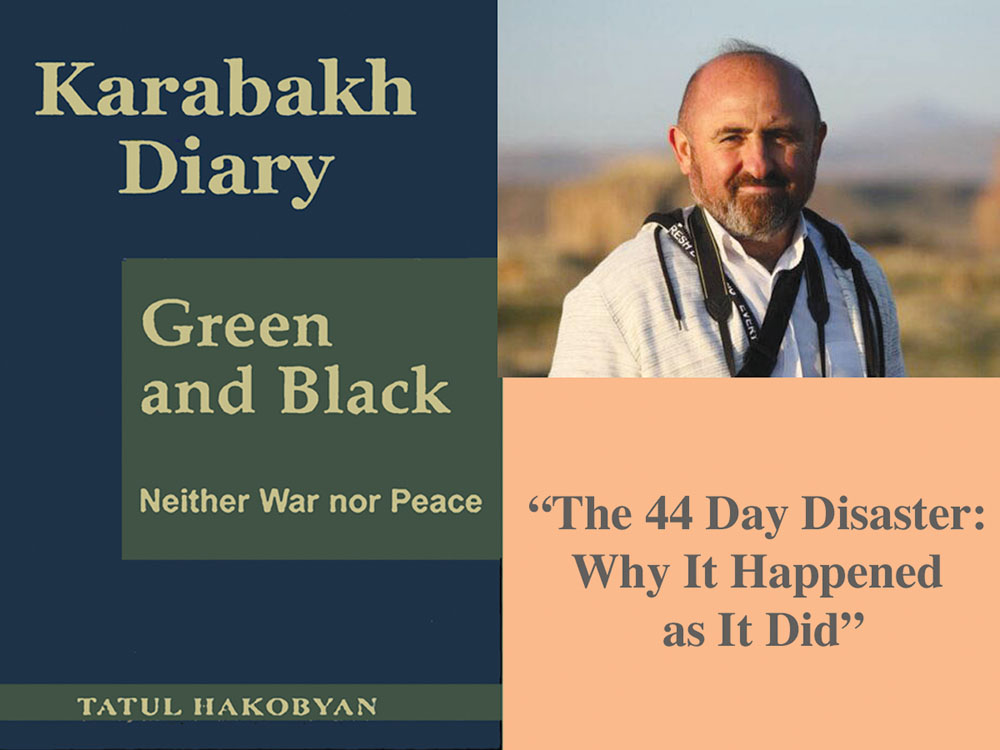
Dustin Vartanian
Staff Writer
“Unfortunately, we did nothing to avoid this disastrous war.” These are the words of political analyst and author Tatul Hakobyan. Eight months have passed since the war between the Republic of Artsakh and Azerbaijan began on September 27, 2020 and the Republic of Armenia also finds itself in the middle of a political crisis.
On Saturday March 6, 2021, Hakobyan presented his thoughts about the recent war in Artsakh and the rising political tensions occurring today in Armenia. His lecture was titled, “The 44 Day Disaster: Why it Happened as It Did.” Hakobyan is an expert on this topic as he has covered the relationship between Armenia, Artsakh, and Azerbaijan for many years.
The presentation was moderated by Prof. Barlow Der Mugrdechian and was part of the Armenian Studies Program Spring 2021 Zoom Lecture Series and co-sponsored by the Homenetmen Fresno Sassoun Chapter.
The main topic of the presentation was outlining why the war was such a disaster for Armenia. Hakobyan explained several reasons why Armenia failed in the September war. He began by saying that Armenia “engaged in wishful thinking instead of facing reality” in terms of the Nagorno-Karabakh conflict. Hakobyan stated that the Armenians were overconfident and that many Armenians thought that “if Azerbaijan started a war, we could win a war and we can win new territories.”
Hakobyan also explained that since the first Artsakh War, which ended in 1994, Azerbaijan has been strengthening its army with help from its “friends”: Turkey, Israel, and Russia. He stated that after the experiences with this war “we understood that there is a new reality in the Southern Caucasus. The reality is that the Azerbaijani Army is strong enough to defeat the Armenian and Karabakh armies.”
Hakobyan also explained that the Armenians were at a disadvantage with Azerbaijan’s use of drones and Russia’s neutrality in the war. Altogether, Hakobyan’s assessment was that “there was no chance for Armenia to win this war.”
One of the sub-topics of the lecture was about Armenia’s Prime Minister, Nikol Pashinyan. Today in Armenia, there are opposition groups organizing protests calling for Prime Minister Pashinyan to resign.
Hakobyan agreed that Pashinyan should step down because, “Pashinyan is trying to persuade Armenians that he is not guilty of losing the war. I believe he is guilty. He is responsible for our defeat… Nikol Pashinyan must resign.”
Hakobyan also added that it was known that the war would be a failure from the very beginning. “By the third or fourth day it became obvious to me that we were badly losing this war. I understood at that time there was no organization and that Mr. Pashinyan was the person most responsible,” stated Hakobyan. He also believes that holding snap elections as soon as possible would be one of the best ways for Armenia to get past its political crisis.
Hakobyan interestingly places most of the responsibility of this disastrous war on Armenia. Instead of focusing on the external issues that started the war, he looked internally to understand what Armenia could have done to prevent this war.
He explained that it was very obvious that Azerbaijan was going to start a new war and Armenia missed the opportunity to strengthen itself in preparation. Numerous interesting questions were asked by the participants during the second half of the presentation. One of the questions was why Armenia has failed diplomatically in the last thirty years pertaining to the Karabagh conflict. For the past several years, Armenia has not been able to create stronger diplomatic ties with other countries throughout the world.
Hakobyan had a thought-provoking response. He stated that Armenia’s diplomacy is not the problem but rather the problem is “all of the countries in the world clearly said that Armenia should withdraw from the five adjacent territories in Nagorno-Karabagh, but we did not listen to them. That is why we do not have friends in this world.”
This is also obvious because “no country in the world blamed Azerbaijan for starting this war.” Hakobyan concluded his response by stating that “we thought we could keep all of the territories and that is why we lost everything.”
Another participant asked what the prerequisites were for a peaceful solution of the Nagorno-Karabagh conflict.
Hakobyan gave several different scenarios for a possible peaceful solution. He stated that the conflicts between Armenia and Azerbaijan will never be solved through war.
“With zero-sum games the Nagorno-Karabagh conflict will never find a solution. We need a reasonable solution. We need a well-balanced solution. … war is not an option.”
This presentation provided the participants a great opportunity to ask questions to an expert on the Nagorno-Karabagh conflict, who has witnessed the events unfolding throughout the years. It was also intriguing to listen to all of the questions the participants asked as it contributed to this uniquely styled lecture.
Hakobyan answered the participants questions in de-tail and gave an informative presentation which educated the audience on the current situation in Artsakh and Armenia.
 Hye Sharzhoom Armenian Action
Hye Sharzhoom Armenian Action